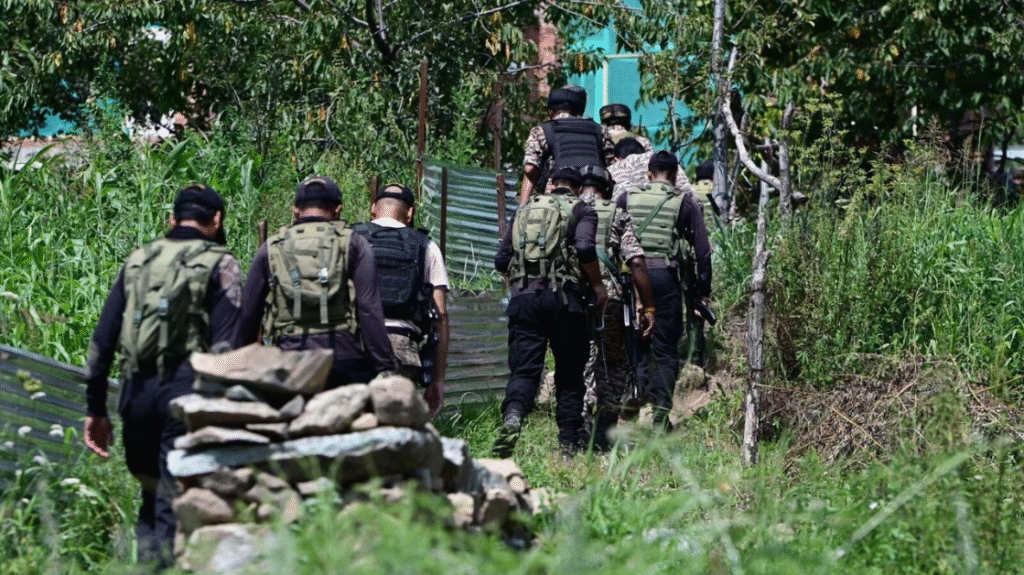Srinagar, July 28, 2025 – In a major counter-terror operation named “Operation Mahadev”, the Indian Army, in coordination with Jammu & Kashmir Police and CRPF, eliminated three terrorists linked to the April 22 Pahalgam terror attack, including Hashim Musa (alias Sulaiman Shah), identified as the mastermind behind the massacre of 26 civilians, mostly tourists.
🧩 Background: The Pahalgam Attack & Operation Sindoor
On April 22, 2025, terrorists opened fire on a group of tourists in Pahalgam, killing 26 people. Soon after, Operation Sindoor targeted terror infrastructure across Pakistan and PoK. Operation Mahadev followed, aimed at neutralizing terror cells responsible for executing the attack.
🕵️ Planning & Execution
The operation followed nearly 14 days of intensive surveillance, intercepts, and drone tracking in the dense Dachigam forest near Srinagar. Intelligence intercepted encrypted communications from terrorists believed to be planning further attacks. On July 28, at around 11 a.m., elite para commandos from 4 Para and units of 24 Rashtriya Rifles engaged the three terrorists near Mahadev Hill in Lidwas. The terrorists were reportedly caught off-guard, resting in a hideout.
🔫 Outcome & Neutralisations
In under an hour, all three terrorists were killed. Weapons—including an M4 carbine, two AK rifles, grenades, and other war-like stores—were recovered from the site. Among the slain were:
- Hashim Musa (Sulaiman Shah): Alleged mastermind of the Pahalgam attack and former Pakistan Army commandos trained in forest warfare.
- Jibran and Hamza Afghani: Identified as top operatives involved in the Sonamarg Tunnel attack in 2023.
Bodies were handed to police for identification and legal formalities, per standard protocols.
⚖️ Political & Legal Reactions
Government Confirmation:
The Chinar Corps confirmed, via X, that three terrorists were neutralized and the operation remained ongoing. Defence Minister Amit Shah addressed Lok Sabha, calling Operation Mahadev a joint success of Army, J&K Police, and CRPF.
Political Commentary:
Congress leader Udit Raj questioned the timing of the encounter, suggesting it may have been orchestrated to align with Parliament debates on Operation Sindoor—calling it potential “event management”.
Victim’s Response:
Aishanya Dwivedi, widow of a Pahalgam terror victim, said the attack’s resolution brings partial peace:
“The pain will not go, but some peace may come knowing those responsible are gone.”
🚨 Legal Implications & Precedents
Use of Lethal Force & Rules of Engagement:
Under Indian law, lethal action is justified against terrorists posing imminent threats. Operation Mahadev adheres to established Counter-Terrorism protocols and the Armed Forces (Special Powers) Act’s (AFSPA) legal boundaries, given the declared militancy zones.
Intelligence Handling & Prosecution:
Recoveries and intercepts suggest strong forensic evidence, which could support future criminal prosecution under the Indian Penal Code (e.g., Sections 121A, 302, 307) and the Unlawful Activities (Prevention) Act.
Judicial Accountability:
In past rulings, Indian courts have upheld the state’s right to prosecute terror suspects but called for transparency and oversight. Operation Mahadev’s operational conduct will likely come under public scrutiny if challenged.
🔍 Wider Strategic & Security Outcomes
Milestone in Counter-Terror Campaign:
Operation Mahadev marks one of the largest tactical successes since the Pahalgam attack, dismantling a high-level terror cell and helping restore security confidence in the Kashmir Valley.
Deterrent Impact:
Eliminating Sulaiman Shah and operatives involved in multiple terror incidents reinforces counter-terror deterrence doctrine and limits operational capacity of sleeper cells.
Operational Learnings:
The use of invisible, encrypted communication tracking, combined with drone surveillance and coordination among Army, CRPF, and local police, demonstrates advanced integrated intelligence operations.
✅ Conclusion
Operation Mahadev was a meticulously executed security operation leveraging intelligence, coordination, and tactical precision to avenge one of Kashmir’s most brutal terrorist strikes. As it delivers solace to victims and strengthens national security resolve, the operation also underscores India’s evolving legal and operational capacity in counter-terrorism watersheds. A hearing is expected soon regarding legal status of recovered terrorism modules, while investigation into remaining associates continues.
To read more Indian Laws and news, visit Legal Guide India



